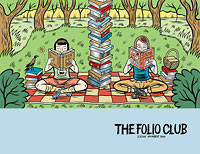Folio Fellow
An editor and publisher discusses the power of print, creative collaboration, his favorite authors, and his home library Interview Rebecca Rego Barry
In this issue of Fine Books, we talk to Robert Pranzatelli, founding editor and publisher of The Folio Club, a new literary magazine in book form that celebrates the art of prose narrative. The second issue will be published in May.
FB: It seems like a rough time to launch a literary magazine, considering all the talk that ‘print is dead.’ What’s your sense so far? Do you think serious readers will always want a printed format?
RP: As the bibliophile said to the techie: If print is dead, why does it make me feel so alive? In this regard I have an interesting story. My original concept for The Folio Club was that it would be primarily electronic, perhaps a PDF, with a print-on-demand version that would exist mostly for contributors (because every writer or artist wants to hold the finished work in hand as an object). But when I saw the first issue, I fell in love—so much so that I decided to set aside the electronic format for a little while, even if it means that the early issues initially circulate to only a tiny coterie. I’m sure I will offer e-formats soon enough, but I felt The Folio Club had to begin with print.
FB: Who are your creative collaborators on the magazine, and why did you choose them?
RP: So far my collaborators are Romy Ashby, Mark Saba, and Onsmith. They’re each quite different, but they have three things in common. First, I love their work. Second, they’re fairly prolific, so they can contribute on an ongoing basis. Third, they’re great people and nice to work with. All three points are essential, and that’s why I chose them.
FB: The first cover illustration was brilliant – a comic illustration of the piles of books and manuscripts that we—book lovers—tend to let pile up around us. It also reminded me of a typical book publisher’s office. Is that your office?
RP: No, my office is neater, and it has a window with a nice big piece of sky. But that cover illustration resembles a kind of inner sanctum that we book lovers carry around inside ourselves, like an archetypal reading-room, which I think is why it elicits such a strong sense of recognition.
FB: As a follow-up to that, The Folio Club mixes indie comic art with serious literary short stories. Seems like strange bedfellows. Why and how did that fusion come about?
RP: Oh, these “strange bedfellows” have been making eyes at each other for a long time. Think of the expansion of New Yorker visuals over the last couple of decades, from cartoons to graphic novel excerpts. And the indie cartoonists who have become New Yorker cover artists in recent years, people like Chris Ware, Dan Clowes, Ivan Brunetti. In fact it was Ivan’s graphic fiction anthologies for Yale University Press—books for which I served as publicist—that reawakened my long-dormant interest in comics. And it was also Ivan who introduced me to Onsmith—not to his work, but to him, with an old-fashioned, shake-your-hand kind of introduction; I later checked out his work online and decided this was definitely someone to watch. So, to whatever degree The Folio Club represents a fusion, it’s a convergence of my personal interests, and it parallels other forces already flowing together in our culture. I like the idea of furthering the crossover between certain kinds of literary and visual tastes.
FB: The first issue was also dedicated to Edgar Allan Poe, “for providing our name.” Tell me about that.
RP: Near the beginning of his career, Poe wrote a satirical sketch called “The Folio Club” about a writers’ group that gathers to read “short prose tales” to one another. The sketch is narrated by a hostile former participant, eager to describe the group in the most insulting terms—a sort of comic foretaste of the various mad men and madmen the young Poe had in store. I thought The Folio Club would be a great title for a literary magazine because it works on so many levels: serious, tongue-in-cheek, allusive, metaphorical.









